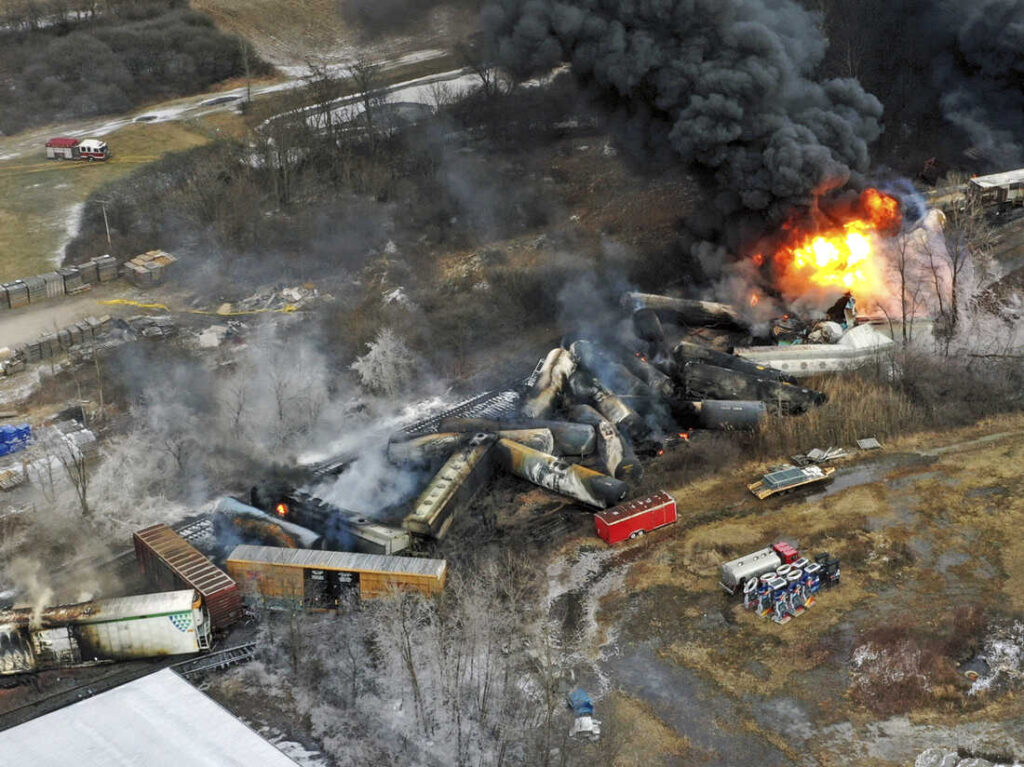Opinion: Why Capitalist Greed is at the Center of the Ohio Train Derailment Incident
By Jack Herr, Sports Editor

This photo taken with a drone shows portions of a Norfolk and Southern freight train that derailed Friday night in East Palestine, Ohio are still on fire at mid-day Saturday, Feb. 4, 2023. (AP Photo/Gene J. Puskar) (Photo and caption courtesy of the Associated Press).
While UFOs and Chinese spy balloons dominate the current American news cycles, not enough attention is being given to the Ohio train derailment incident, which could end up being one of the worst environmental disasters in recent history. While it is likely to live up to those expectations, it also represents the pinnacle of capitalist greed and a complete failure of governmental regulation.
The environmental danger stems from the release of a number of toxic chemicals following the derailment and ensuing explosion. Five of the derailed cars carried vinyl chloride, a known human carcinogen linked to the development of a rare form of liver cancer as well as brain and lung cancers, lymphoma and leukemia. The EPA confirmed that vinyl chloride and other dangerous chemicals have leaked and continue to leak into the air, surface soils and surface waters. The six million people who rely on the Ohio River for drinking water are in danger if the river becomes contaminated. If groundwater sources also become contaminated, the 25 million people who inhabit the Ohio River Basin are under a longer-term, potentially more dangerous threat.
Some may say that for incidents like this one, no one is to blame. Some may call it an “accident.” Of course, this was not some kind of premeditated attack, but it was also not a random, unpreventable incident. The greed of the Norfolk Southern Corporation was the impetus for the train derailment.
For starters, Norfolk Southern has spent millions of dollars lobbying the federal government for less stringent safety regulations on trains. Along with other industry leaders, they pressured the Obama administration in 2014 out of including trains carrying combustible materials, such as the ones released in the Ohio train derailment, in a proposal to improve safety conditions; the adopted measure was narrowly tailored to address the transport of crude oil.
Later during the Trump administration, Norfolk Southern and other rail industry lobbyists again channeled millions of dollars into slashing regulatory policies requiring trains carrying hazardous flammable materials to use Electronically Controlled Pneumatic (ECP) brakes. ECP brakes reduce stopping distances significantly compared to conventional air brakes and would have mitigated the scale of and damage caused by the Ohio train derailment.
While Norfolk Southern was siphoning ungodly amounts of money into rolling back train safety precautions, it was also implementing a cost-cutting system that prioritizes efficiency over safety. Since 2017, companies like it have cut more than 22 percent of their workforce along with lengthening their trains. While industry CEOs are confident these changes will not negatively impact the safety of their operations, unions are warning that the opposite is likely to occur; time allotted for train inspection and maintenance has dropped significantly, and less-trained workers are responsible for such tasks.
As the cherry on top, Norfolk Southern, with a net worth of over $50 billion, donated a meager $1.2 million to local families displaced by the incident. Furthermore, the company only might be responsible for costs associated with the cleanup of the incident. It has also already resumed railway operations in the area while hundreds of residents remain in a state of limbo. You can be sure it will do whatever it can to avoid responsibility and punishment.
What can we learn from Norfolk Southern’s track record? The most vital lesson is that it, like so many other major companies in various industries, values cutting costs, avoiding government interference and therefore raking in immense profits over any other considerations. The health, safety and happiness of workers, their unions, and regular citizens are given little to no attention. When this happens, disasters are imminent and there is no denying its complicity in the train derailment.
Simply put, this type of corporate malevolence is a symptom of the unfettered capitalism reigning over the United States. We live in an economic system that incentivizes greed and monopoly, rewards administrative executives with the vast majority of profits for doing none of the actual work and makes changing government policy for the benefit of everyday people impossible.
To the last point, this incident is a major indictment of money in politics. It is frankly easy for a company like Norfolk Southern to structure the regulatory policy presiding over its industry. Is that not the antithesis of regulation? Our government is far too permeable to the wants and needs of the ultra-wealthy.
Finally, to lawmakers, voters and political influencers who tout anti-regulation views, incidents like this are what happen when the government is barred from intervening in the economy. This kind of “free” market is only free for those with the economic and political wealth to control it—for everyone else, it is deadly.
